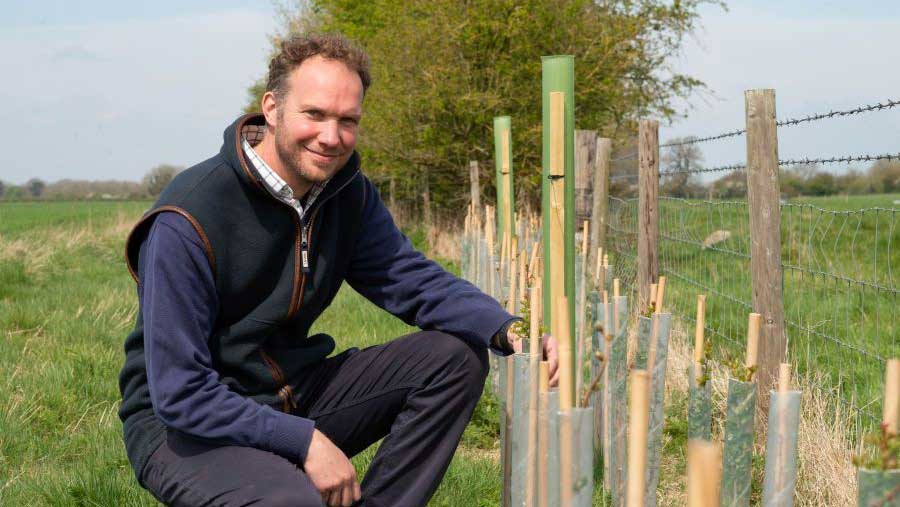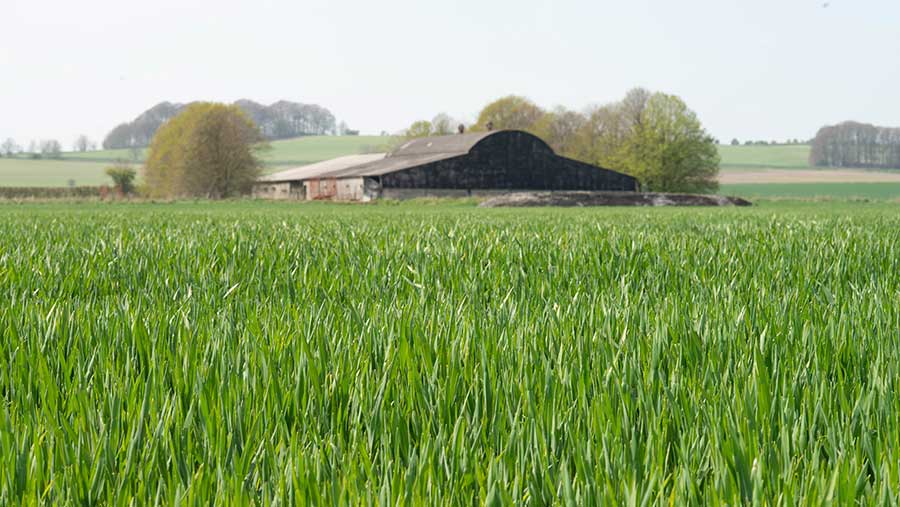Advertiser content
Combining a working farm with a passion for the environment
Fourth-generation farmer Ben Butler is adamant that it is possible to balance pursuing a passion for the environment with running a successful business.
Ben took over as director of 1000-acre Manor Farm in Avebury, Wiltshire from his father Robin in 2014 and has inherited his long-standing interest in adopting nature-friendly farming practices.
Signing up to the Woodland Trust’s MOREhedges scheme has helped Ben on both fronts.
The farm, which has been in the Butler family since 1937, is a mix of around 750 acres of arable and 250 acres of grassland. In total Ben has around 2,000 acres across various sites.
They raise about 100 head of beef cattle, graze around 140 ewe lambs and, on the arable side, rotate wheat, winter barley, spring barley, oilseed rape and some spring beans and spring linseed.

© Philip Formby/WTML
A farm steeped in history
Combining a working farm and making the finances work while doing their bit for wildlife and conservation remains “hugely important”.
But while the challenge is one Ben and his father have long embraced, there has been an added complication.
Manor Farm is on a World Heritage site and home to the largest Neolithic henge monument in Britain, meaning it’s a hugely popular tourist attraction and “very challenging to run a business”.
Avebury has the famous stone circle and we are in the same World Heritage site as Stonehenge. We receive 350,000 visitors a year, and this is just a normal village so that is a quite a lot of pressure. Trying to achieve planning permission or basically dig a hole without someone looking over your shoulder is difficult.” – Ben Butler
Balancing food production and nature goals
Ben and his father started to get “heavily involved” in the conservation and stewardship side in about 2000.
“Should we be producing food or giving up farmland to wildlife? That’s a good and topical question. I actually think you can do both and I think we have been doing it successfully.
“Certainly since we started we have – and the data shows it – been producing foods and farming on a good scale, but around the edge of fields you don’t have to farm right up to the fence line any more.
There is a place for wildlife.
“Wildlife is a benefit to what we do. The public want to see it. It’s good for the image of the industry and it’s good for the environment. There has been no detraction by planting up hedges. And what we have been doing by planting around the edges of fields, I am only seeing the benefits.”
Much of Manor Farm was hedged in the 50s and 60s and Ben wanted to return it to its former state.

Manor Farm © Lloyds Bank
“Talking to the older generations they recall boundaries of fields being hedged and we felt it would be nice to put it back.
“We planted the maximum 250m of hedges that the MOREhedges scheme allows, with 50 common oak trees, a prescribed mix of blackthorn, crab apple, dogwood, dog rose, field maple and hazel.”
The planting will increase shelter and improve corridors for wildlife.
Ben added, “The Woodland Trust is very well respected, and I was happy with the stock I was getting. It was important that it was UK-based. I was confident and comfortable about the longevity and traceability and what was going to be planted.
“It had all been properly spiralled, caned and tree sheltered. The guy planting was experienced and I couldn’t fault any of the materials, plants, or the process. It was great. I wouldn’t have a second thought about going back to the Woodland Trust.”
Find support for your own planting scheme
The Woodland Trust MOREhedges scheme can cover up to 75% of the cost if you plant 100 metres or more of new hedging and allow a large tree to grow every six metres.
To find out more visit woodlandtrust.org.uk/lloydsbank
Lloyds Bank and the Woodland Trust are working in partnership to support farmers to transition to a low carbon future.

Lloyds Bank plc authorised by the Prudential Regulation Authority and regulated by the Financial Conduct Authority and the Prudential Regulation Authority under Registration Number 119278. The Woodland Trust is a charity registered in England and Wales (No. 294344) and in Scotland (No. SC038885). A non-profit-making company limited by guarantee. Registered in England No. 1982873.
Provided by
Lloyds Bank is committed to being a leading UK commercial bank for sustainable growth, helping our clients’ transition to sustainable business models and operations, and to pursue clean growth opportunities.
